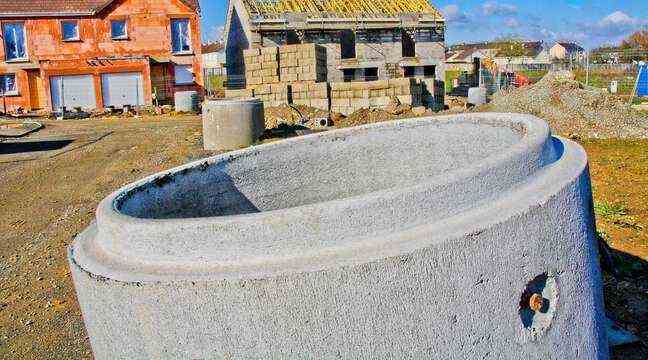Illustration of a housing estate under construction, here near Le Mans, in the Sarthe region. – Gile Michel / SIPA
It had to come to this. In February, the Prefect of Côtes d’Armor took the decision to freeze building permits in 18 of the 57 municipalities in the Guingamp-Paimpol agglomeration. The reason ? The dilapidated nature of the wastewater treatment networks and the non-compliance of a large number of wastewater treatment plants, which overflow in the event of heavy rains. Admit that this happens regularly in the region, and not just on idiots. Due to a lack of investment, several territories in Brittany see their installations deteriorate: the pipes leak and the connections of the new inhabitants are made in an increasingly anarchic manner, which generates regular pollution.
“In 2019, a station in the agglomeration discharged its wastewater for ninety days into the coastal river of Trieux,” notes Dominique Le Goux, member of the Water and Rivers of Brittany association. “When it rains a lot, there are regular intrusions of rainwater in the stations which see volumes arriving that they do not have the capacity to treat, leading to discharges into rivers and chronic pollution,” says- she does.
In the West, the failures of sanitation networks are regularly denounced by shellfish farmers, whose filtering shellfish are the first involuntary receptacles of viruses or bacteria of human origin present in the water. “Sanitation is our pet peeve. The wastewater treatment plants are or are not well dimensioned or not well sealed or not well carried out ”, recognizes Philippe Le Gall, president of the national shellfish farming committee, which assesses the annual damage at“ millions of euros ”.
Only 22% of areas have “good” water quality
Ifremer, which monitors markers of fecal contamination in 413 shellfish-growing areas in France, estimated that only 22% had “good” water quality in 2019, against 72% “average” quality. “Of our 55 sanitation systems, 21 are considered to varying degrees as non-compliant, the work is colossal”, testifies Gervais Egault, vice-president of the Lannion Trégor Communauté agglomeration, which plans to invest 96 million euros until 2025 in sanitation.
The problem with these very expensive works is that they are “difficult” and “not very rewarding” for elected officials, according to Gilles Huet, volunteer at Eau et Rivières. “We smash the streets for work underground, without immediate impact on people like a nursery, so that for a long time, communities have turned a blind eye by continuing to grant building permits,” he continues.
But the tide is turning. In December, the government ordered prefects to show firmness in forcing communities to comply with the European directive on urban wastewater treatment. France is already in violation, “any new major violation exposes France to significant financial penalties”, warns the government.

